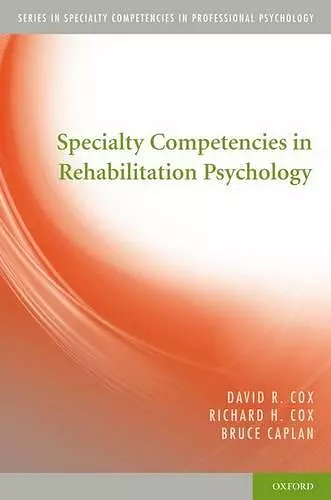Specialty Competencies in Rehabilitation Psychology
Richard H Cox author David R Cox author Bruce Caplan author
Format:Paperback
Publisher:Oxford University Press Inc
Published:3rd Oct '13
Currently unavailable, currently targeted to be due back around 25th January 2025, but could change

An increasing number of psychologists who were trained in clinical psychology, health psychology, or another specialty are gravitating toward rehabilitation psychology, but many of them have little or no experience with rehabilitation populations. With the explosion of interest in traumatic brain injury (TBI), many neuropsychologists are taking jobs in rehabilitation settings that treat people with TBI but also care for persons with the array of other disabling conditions such as spinal cord injury, stroke, MS, and amputation. In Specialty Competencies in Rehabilitation Psychology, Drs. Cox, Cox, and Caplan provide a guide to the knowledge and skills required by competent rehabilitation psychologists, with an emphasis on the evidence base of the specialty. The volume will be valuable to those preparing for the Board Certification Examination in Rehabilitation Psychology and will also be valuable to newcomers to the field and to clinicians working on an outpatient basis with individuals with a wide variety of chronic conditions. Series in Specialty Competencies in Professional Psychology Series Editors Arthur M. Nezu and Christine Maguth Nezu As the field of psychology continues to grow and new specialty areas emerge and achieve recognition, it has become increasingly important to define the standards of professional specialty practice. Developed and conceived in response to this need for practical guidelines, this series presents methods, strategies, and techniques for conducting day-to-day practice in any given psychology specialty. The topical volumes address best practices across the functional and foundational competencies that characterize the various psychology specialties, including clinical psychology, cognitive and behavioral psychology, school psychology, geropsychology, forensic psychology, clinical neuropsychology, couples and family psychology, and more. Functional competencies include common practice activities like assessment and intervention, while foundational competencies represent core knowledge areas such as ethical and legal issues, cultural diversity, and professional identification. In addition to describing these competencies, each volume provides a definition, description, and development timeline of a particular specialty, including its essential and characteristic pattern of activities, as well as its distinctive and unique features. Written by recognized experts in their respective fields, volumes are comprehensive, up-to-date, and accessible. These volumes offer invaluable guidance to not only practicing mental health professionals, but those training for specialty practice as well.
"For those interested in understanding expected competencies of rehabilitation psychologists, this is the definitive resource; one should not have to develop fatigue in deciding to read, use, and refer to it liberally. This 191-page volume is structured in an easy-to-read format, starting with a handy table of selected events in the history of rehabilitation psychology and a brief text description of the history of rehabilitation psychology in the introduction. The authors provide copious references and resources for those interested in further information. Readers will likely find it a useful introduction to rehabilitation psychology, as well as an excellent guide for preparation for specialty accreditation." -Monica Kurylo, Tiffany Meites, PsycCRITIQUES
ISBN: 9780195389241
Dimensions: 155mm x 234mm x 13mm
Weight: 295g
208 pages